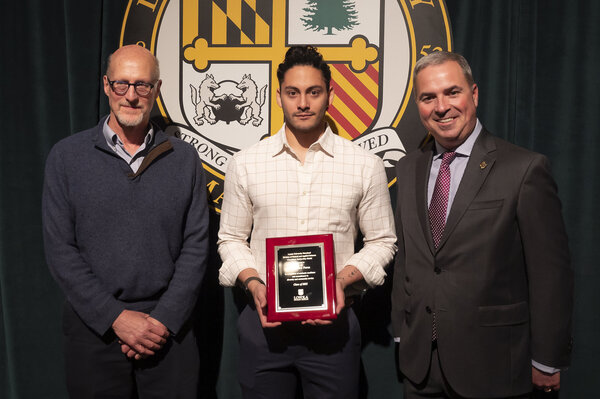Sharing passion for advocating and working with minoritized groups

Reflection from Alejandro Perez, '22, Biochemistry major, 2022 Choudhury Sarkar-Dey Medalist
Throughout my years at Loyola, I have been fortunate enough to get involved in various extracurriculars, many of which (if not all) have dealt with diversity, equity, and inclusion in some way or another. Due to this, I have found a passion for advocating, and working with minoritized/ underrepresented groups inside and outside of our Loyola campus. My name is Alejandro Perez, and I am an immigrant, student-athlete, Biochemistry major with the hopes of pursuing a career in Medicine.
During the past four years, I have been actively involved in several organizations like Student Athletes for Social justice (SA4SJ), Society for Underrepresented Pre-Health Students (SUPHS), and Health Outreach Baltimore (HOB). Although these are all different organizations, they all focus on similar things: supporting and working with those that need it the most. For example, SA4SJ was created as a response to the many racist events that have happened (and are still happening) within our country. Me, and other student-athletes, founded this organization because we believed that we had a special voice within our Loyola campus due to our position of “student-athlete”. Thus, we decided to use that to our advantage and started to amplify the conversation about racism, equity, and inclusion. In the past, this organization has coordinated casual conversations, book discussions, guest speakers, surveys, etc. In addition, I have been working on a separate project that focuses on classroom climate, since one of our surveys revealed that many student-athletes don’t feel comfortable in the classroom. I thought it would be safe to assume that if student-athletes felt this way (coming into this school with a support system: their team), then this result would likely be replicable, if not more severe, with the general student body. Thus, I have suggested that a mid-semester survey be implemented during classes to address, or at least make present, any issues that might be happening in the classroom (This is still a work in progress!).
Also, as a STEM student, I have been able to get involved in clubs and organizations that interest me not only by working with the community, but also with science. Currently, I am the co-president of the SUPHS. This club focuses on working with underrepresented pre-health students (regardless of career interest) to guide them and advise them through their years at Loyola, as many of us have no idea how to “do college”. Previously, I have led meetings that focus on CV/Resume building, goal setting, timelines, and study techniques and tips. This has not only allowed me to develop some of my leadership skills, but it has also allowed me to be a part of this tight-knit community within the Loyola campus. We also host alumni panels where we host some of the previous Loyola graduates that also identify as underrepresented in healthcare and in the sciences, to talk to us about their careers, achievements, and tips (plus it is always nice seeing the alumni). Likewise, HOB has given me the ability to go into the field that I am interested in, but at the same time connect and serve the greater Baltimore community. During shift, we go to Mercy Medical Center and interact one-on-one with patients. I am part of the Center for Advance Fetal Care Unit at the hospital, and there, I work closely with pregnant women and their families to find any resources that might make their daily lives a bit easier. Some of these resources include employment, baby food, baby clothes, cribs, insurance, WIC, and/or food stamps. More often than not, the families that I tend to interact with at the hospital are part of the underrepresented/minoritized communities, and thus, this HOB has allowed me to be involved with the medical world, while working with the specific group of people that I intend of working with in the future. Aside from going on shift, we also meet once a week to discuss how things are going in the hospital, what current events might affect these resources, different social determinants of health, and how to properly communicate with patients.
Aside from these organizations, I am actively involved in research on and off-campus. I was a part of Dr. Kazi’s lab for two semesters where we studied stem cell protein expression levels in drug resistant cancer cells. Likewise, I was chosen to participate in a neuroscience fellowship at the University of Michigan in the summer of 2021, where I did research under the guidance of Dr. Patrice Fort and Dr. Lynda Elghazi. We studied the pathophysiology of Diabetic Retinopathy and tried to identify some of the proteins that might be activated within the Complement system as the disease progresses in human eyes. At the end of summer, I presented my findings at a poster session and at an in-person presentation followed by Q&A. Lastly, I am currently employed at the University of Maryland Medical School in the neurobiology department, where I work as a research assistant in the Pina lab, where we study dopaminergic circuitry (which is related to reward processes) in addictive behaviors like alcohol and drug consumption.
I can confidently say that my past 4 years here at Loyola have encompassed how I would like to pursue the rest of my career, as an intertwining between science and service to marginalized and underrepresented communities. I am glad that these opportunities were available to me, and I hope to share the same with the current and uprising students.